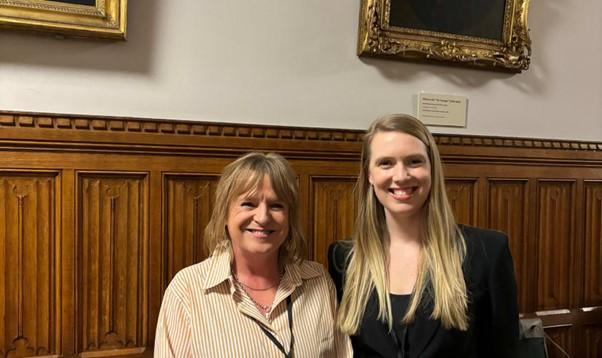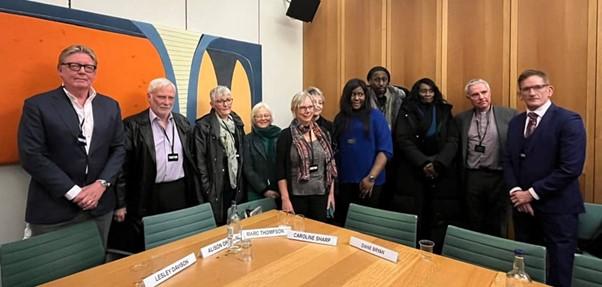INQUEST’s work on two Justice Committee inquiries into the Coroner Service
INQUEST is the only charity providing expertise on state related deaths and their investigation to bereaved people, lawyers, advice and support agencies, the media and parliamentarians. INQUEST’S specialist casework includes deaths in police and prison custody, immigration detention, mental health settings and deaths involving multi-agency failings or where wider issues of state and corporate accountability are in question.
Over the past four years, the UK Parliament’s Justice Committee have carried out two inquiries into the Coroner Service. The first inquiry, launched in 2020, set out to look at ‘unevenness’ in the service, as well as the impact of the COVID-19 pandemic.
Three years later, the Committee announced a follow-up inquiry to examine some of the key issues highlighted in its first report, from delays in coroner’s courts to the impact of reports made to prevent future deaths.
Issued raised
INQUEST’s various submissions to the Justice Committee, in addition to much of the testimony highlighted by families, has evidenced the following key major concerns with the inquest system. Much of this is echoed by Birkbeck’s Voicing Loss study, and by the Justice Committee themselves in their two reports on the coroner service.
A key finding from our casework service is that more needs to be done to strengthen the follow up on inquest conclusions and Prevention of Future Death (PFD) reports. The current lack of oversight and follow up to coroner’s PFDs means that bereaved families are left unaware as to whether progress has been made following the death of their loved one. This can take a considerable emotional toll on families and the impact of hearing about another similar death cannot be overstated.
As the father of a man detained in a Priory-run mental health setting who died from neglect said: ‘The coroner issued an excellent, comprehensive Prevention of Future Deaths Report (PFD) covering the Priory and the Department of Health. The coroner provided me with their letters of acknowledgement, but I have no idea if any of the recommendations have actually been implemented.’
This is why INQUEST is calling for the government to establish a new, independent public body called a National Oversight Mechanism which would be responsible for collating, analysing and following up on recommendations arising from state-related deaths.
INQUEST’s evidence submission to the follow-up inquiry also highlighted that there is limited evidence of progress in putting bereaved families at the heart of the coroner service. The evidence from INQUEST’s casework service shows that the reality of whether families are placed at the heart of inquests remains a mixed picture. The responses from bereaved families to an INQUEST survey show that of the 15 responses received, six families said they did not feel put at the heart of the inquest into their relative. Five families felt they were ‘to some extent’ while only two answered ‘yes’ (a further two answered “other”).
Other issues we raised include the fact unfair restrictions remain in the legal aid scheme for bereaved families’ legal representation at inquests, in contrast to the unlimited funding available to public bodies. INQUEST and bereaved families also noted there has been a lack of discernible progress to tackle inconsistencies across the coroner service, and that many coroner areas have experienced acute delays in recent years, often exacerbated by the Covid-19 pandemic. This has had a significant impact on bereaved families’ wellbeing and has undermined the preventative potential of inquests.
Engagement
INQUEST and many of the families we work with welcomed the Committee’s two inquiries and have been encouraged by the Committee’s interest in this often forgotten part of the justice system. As such, we have engaged in both of the Committee’s inquiries.
Alongside its own submission of evidence, INQUEST helped coordinate a separate Family Evidence submission to the Committee’s 2020 inquiry.
The Committee then heard oral evidence from our Director, Deborah Coles and Andy McCulloch, whose daughter Collette died while under the care of a mental health unit.
The only thing that makes sense of the loss of your loved one is that maybe lessons will be learned and the same thing will not happen to someone else.
Andy McCulloch
Following the publication of the Committee’s report on the first inquiry, in 2021, INQUEST coordinated a private meeting between several bereaved families and the then Justice Minister responsible for the coroner’s service, Tom Pursglove. Families were able to share their personal experiences and speak to some of the considerable challenges they faced during the inquest into their relative’s death.

For the 2023-24 follow-up inquiry by the Justice Committee, INQUEST and eight bereaved families met with members of the committee for a private meeting to share more details about their experience of the coronial system. Deborah Coles attended an oral evidence session alongside Dr Georgia Richards, which focussed on PFDs and the preventative potential of inquests.

Next steps
We are now waiting for the Justice Committee to publish their report on the follow-up inquiry. In the meantime, INQUEST and families are pushing forward with our campaigns for a duty of candour and the establishment of a National Oversight Mechanism.
More information
INQUEST’s submission to the Justice Committee’s inquiry into the Coroner Service, 2020
INQUEST Family submission to the Justice Committee’s inquiry into the Coroner Service, 2020
INQUEST’s submission to the Justice Committee’s follow-up inquiry into the Coroner Service, 2024
INQUEST Briefing, No More Deaths: the case for a National Oversight Mechanism